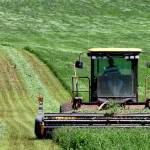Alfalfa: Potential Natural Antacid for Horses Suffering Glandular Gastric Disease

Are you stuck in a seemingly never-ending battle with glandular gastric disease? Feeding alfalfa is an effective way to help reduce the occurrence of gastric ulcers in the glandular region of the stomach, presumably due to its natural antacid properties.
There are two distinct forms of equine gastric ulcer syndrome (EGUS): squamous disease affecting the upper portion of the stomach and glandular disease affecting the lower part of the stomach. Each disease has its own risk factors and treatment success.
“Some reports suggest that feeding horses extremely high levels of starch may contribute to the development of glandular disease,” explained Ashley Fowler, Ph.D., a Kentucky Equine Research nutritionist.*
In terms of treatment, the goal is to decrease the acidity of the horse’s stomach. Omeprazole is a proton pump inhibitor that decreases acid production. While it is effective for ulcers in the squamous region of the stomach, omeprazole is far less effective for glandular lesions. Thus, identifying other ways of manipulating gastric pH are needed.
“Alfalfa has significant buffering capacity, mainly due to its high concentration of protein and calcium, which can help maintain a higher (and therefore less acidic) stomach pH. Thus, replacing some of the dietary starch sources with alfalfa may support ulcer healing in horses with glandular disease,” she said.
To determine if partial replacement of concentrated feeds with alfalfa pellets improves glandular gastric scores, researchers gathered a group of intensively exercised trotters.* Half of the horses remained on their normal diet, while the remaining horses had half of their concentrates replaced with dehydrated alfalfa pellets. All horses had access to hay.
On day 0 of the study, all horses underwent gastroscopy and a glandular ulcer score was assigned based on a scale from 0 to 4, with 0 indicating no ulcers and 4 indicating severe lesions. At that time, 12 horses (17% of the study population) had a glandular score of 2 or more. Six of those horses were in the control group and the remaining six in the alfalfa group. By day 42, only one out of six horses in the alfalfa group had an ulcer score of 2 or more, whereas all six horses in the control group fed their full ration of concentrates still had an ulcer score of 2 or more.
“Clinical success was defined as a horse with an ulcer score of 2, 3, or 4 on day 0 improving to a grade 0 or 1 by day 42. In this study, clinical success was 47.7 times more likely in horses fed alfalfa than the full concentrate ration,” Fowler said.
Thus, the researchers concluded that both the incidence and severity of glandular disease were reduced by feeding heavily exercised trotters pelleted dehydrated alfalfa compared to their normal ration.
“In addition to providing feeds with high natural buffering capacity, such as alfalfa, as part of a horse’s daily ration to reduce the risk of ulcers, Kentucky Equine Research offers a variety of products that are designed to support stomach health. ReSolvin EQ is a revolutionary oil that features a blend of polyunsaturated omega-3 and omega-6 fatty acids scientifically proven to support stomach health,” advised Fowler.
In a study performed by Kentucky Equine Research, severe squamous gastric ulcers completely resolved in 80% of horses after 90 days of supplementation with ReSolvin EQ, according to Fowler. No lesions were found in the glandular regions of these horses at the start of this study, so no comparisons could be made, though its powerful anti-inflammatory mechanisms could be beneficial for glandular disease.
However, in the management of EGGD, a combination of sucralfate with omeprazole is recommended in consensus statements on EGUS. In Australia, Hong Kong, Japan, and Singapore, look for Sucralox, an effective form of sucralfate.
*Julliand, S., M. Buttet, T. Hermange, P. Hillon, and V. Julliand. 2023. Effect of diet composition on glandular gastric disease in horses. Journal of Veterinary Internal Medicine. doi:10.1111/jvim.16747.








